Bucketful of Miracles
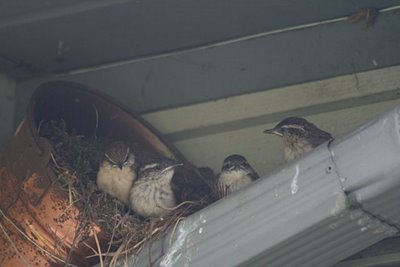 I’ve written about the little copper bucket under our eave. In the 1950’s and early 60’s, it held a philodendron plant that trailed around the stone fireplace in our home in Shawnee Mission, Kansas. Somehow it got passed on to me, and I’ve thrown it in with my stuff and moved it a dozen or more times. It reminds me of my mom.
I’ve written about the little copper bucket under our eave. In the 1950’s and early 60’s, it held a philodendron plant that trailed around the stone fireplace in our home in Shawnee Mission, Kansas. Somehow it got passed on to me, and I’ve thrown it in with my stuff and moved it a dozen or more times. It reminds me of my mom.One day, about five years ago, I saw a Carolina wren trying to make rootlets, leaves and grasses stay on the elbow bend of the downspout by our front door. He’d bring a bunch of stuff, only to see it slide off; I noticed it by seeing a trailer of skeletonized leaves and rootlets hanging down in front of the foyer window.
I caught the wren’s eye as it perched on the gutter. “Hang on. I’m going to help you. I’ll be back in just a minute.” I went to the garage and got my 8’ stepladder and the little copper bucket, a roll of utility wire, a hammer and roofing nail. Climbed up the ladder, drove the nail, wrapped wire around it and secured the bucket up under the eave, where no rain could get into it. Took the nesting material, laid it in the bucket, and climbed down the ladder. Before I had so much as folded the ladder, the wren, who had been watching the whole operation, was hauling moss and trash to that bucket. By nightfall, he had a nest nearly complete. There was no hesitation whatsoever—just immediate, presumably grateful acceptance of my gift.
Having watched a black rat snake climb partway up the gutter two years ago (and removed said snake to another part of the yard), I’d hit upon a way to secure the nest. I wedged a big, heavy cardboard mailing tube between the gutter and the house, which keeps any snake from wrapping itself around the gutter and gaining access to the nest. It’s perfect. So I’m always thrilled to find Carolina wrens setting up housekeeping for a first and often a second brood in the little bucket. Carolina wrens keep the cleanest nest I know; I’ve never found one infested with parasites.
The wrens were sneaky this year, but I knew by the increasing size of the food items they brought that their chicks were nearing fledging. Finally I heard the chicks' sibilant, soft piping change to a squeaky chdeek! –the fledging call, the rally to flight.
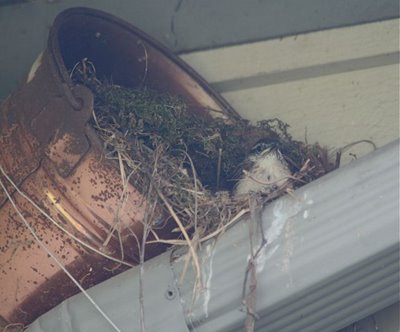 The first baby got a peek at the world, and stayed out front for most of the day.
The first baby got a peek at the world, and stayed out front for most of the day.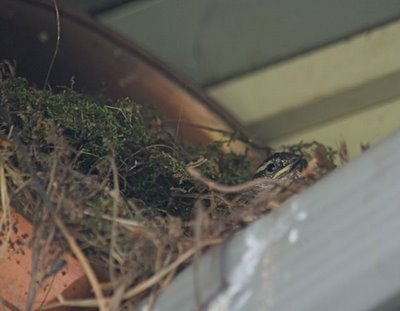
By the next morning, they were lined up on the downspout, sizing up the world. It wouldn’t be long now.
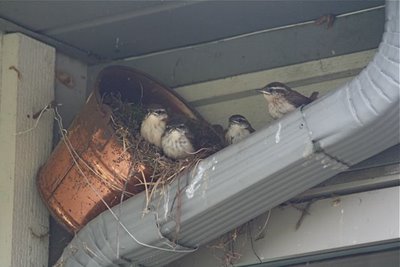
Fluttering and clambering, they scrambled up and onto the bucket top.
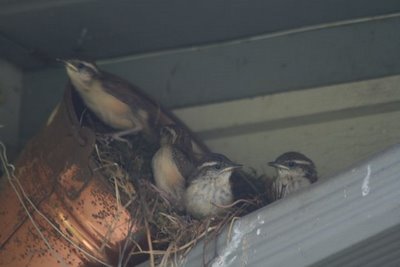 One of them was going to have to try its wings by default.
One of them was going to have to try its wings by default.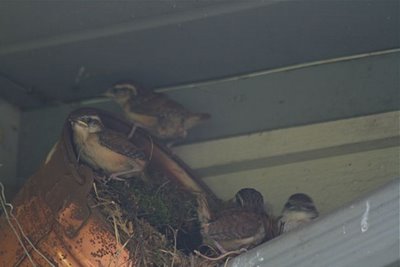 The first buzzed off, crash-landing in the hostas, and four others soon followed.
The first buzzed off, crash-landing in the hostas, and four others soon followed.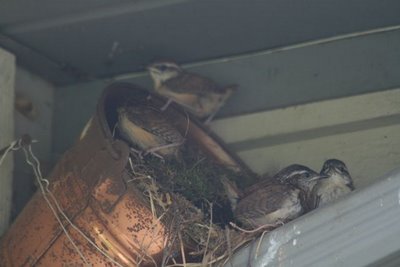
I call this the popcorn phase. Babies are hopping around as if they're on a hot griddle. A slight perturbation around the nest (say, too close an approach, a slamming door) can cause the nest contents to explode. I have been hit by flying baby shrapnel in such instances.
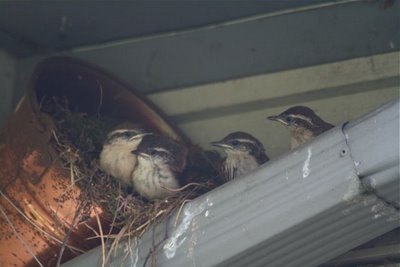 The fifth chick (still in the nest in this picture) stayed for awhile. Awhile being a couple of hours. This was a bad choice on its part.
The fifth chick (still in the nest in this picture) stayed for awhile. Awhile being a couple of hours. This was a bad choice on its part. Next: Science Chimp to the Rescue.
Labels: Carolina wrens, fledging time for wrens

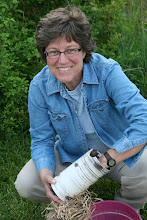

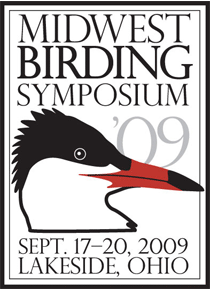
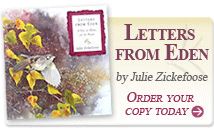

<< Home